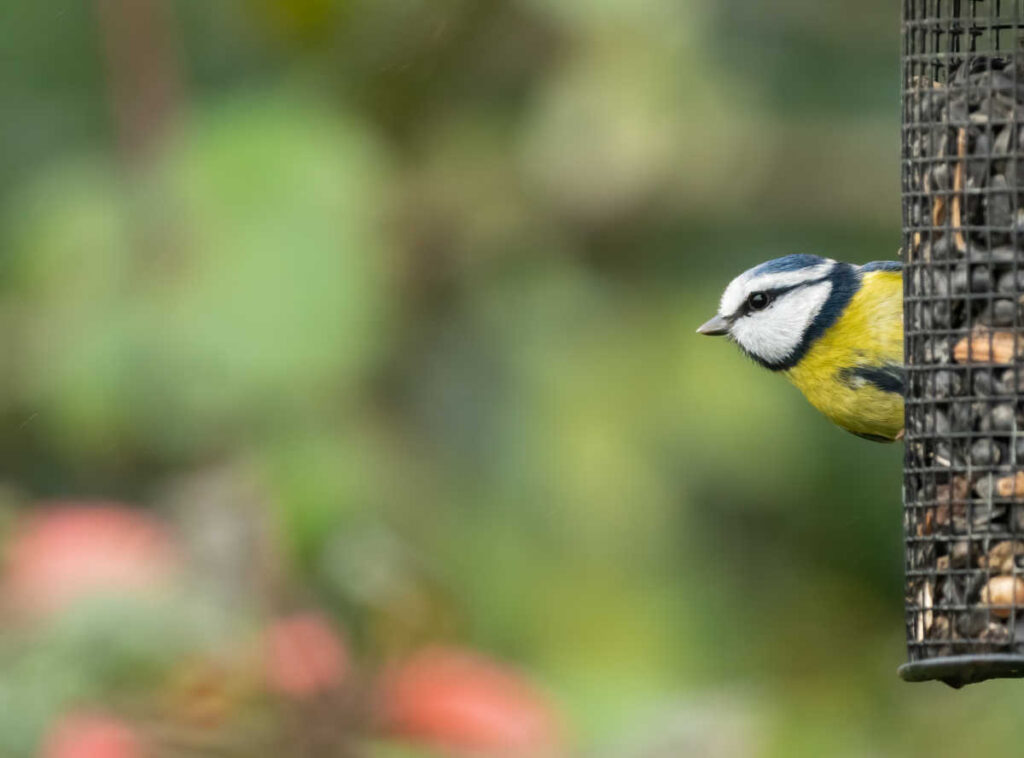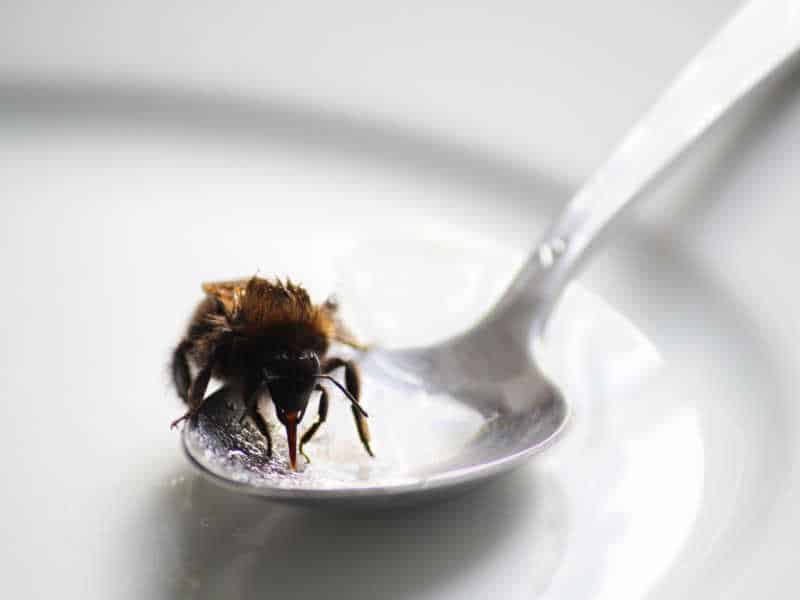The Best Peat-Free Compost Brands In The UK
To support the running costs of Moral Fibres, this post contains affiliate links. This means Moral Fibres may earn a small commission, at no extra cost to readers, on items purchased through these links.
Looking for the best peat-free compost brands in the UK? Save thyme and find inner peas with my handy guide to the brands to know.
Gardening is green by its very nature, but some gardening practices are less than planet-friendly.
Take peat, for example. Since the middle of the 20th century, gardeners have been adding peat to their gardens to grow their plants and vegetables. While peat is technically a renewable resource, its extraction is not considered sustainable and causes serious harm to the environment.
Let me explain more about why peat isn’t so sustainable, and the UK peat-free compost brands to know if you want to have a truly green thumb.
Quick Links To UK Peat Free Compost Brands
Use these quick links to skip to a specific section or keep scrolling for the full post, including all the need-to-know information about peat.
What’s the Big Deal About Peat?
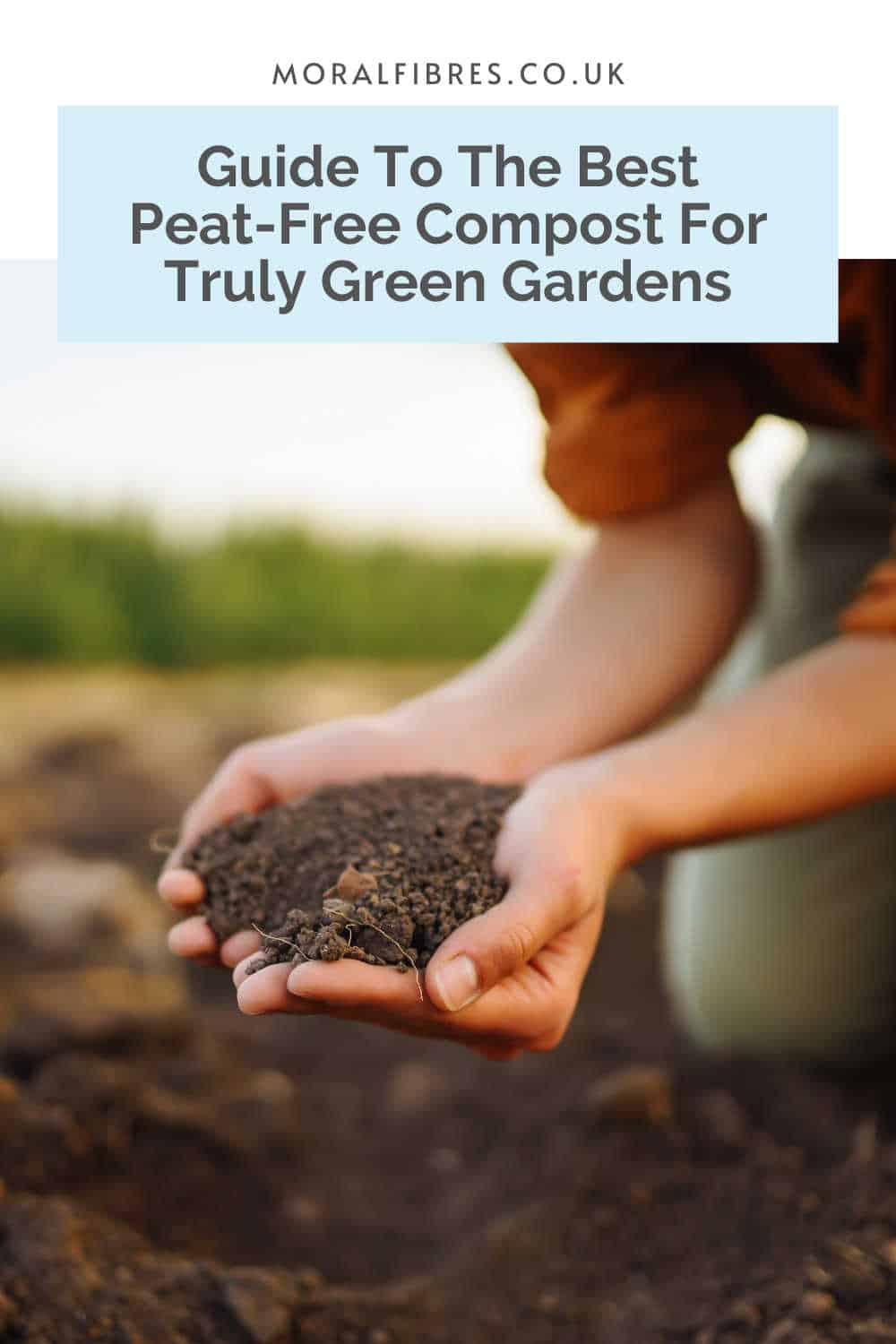
You may be wondering what the big deal is about peat.
Well, peat forms from semi-decomposed plant material, in waterlogged oxygen-poor bogs at about a rate of 1mm a year.
Decomposed plants in water might make peat sound not particularly special, but actually, there’s good reason to get excited about peat.
Peat bogs are unique habitats, home to all sorts of rare plants, animals, and invertebrates that you seldom find outside of peat bogs.
Plus the other completely amazing thing about peat bogs is that they act as carbon sinks – capturing all the carbon that plants absorb while they grow. In fact, peat bogs are essential in our fight against climate change.
Peat was rarely used in gardening until the mid-20th century. It has no nutritional benefit to the soil. However, at this time it was discovered that peat holds water, oxygen, and nutrients well, making it a good medium for growing plants and vegetables. Its usage reached its peak in 1997 when a staggering 99% of the compost sold in the UK contained peat.
At What Cost?
To meet demand from gardeners, acres upon acres of peat bogs across the UK have been drained and dug up to make compost. As peat bogs form at such a slow rate, this rate of extraction is completely unsustainable. This means that peat bogs are now one of the most threatened landscapes in the UK.
This loss of our peat bogs has two main impacts. Firstly, peat extraction releases carbon into the atmosphere – contributing to climate change. So far, peat use in the UK alone has released up to a staggering 31 million tonnes of carbon dioxide (CO2) since 1990.
Secondly, extracting peat destroys the home of the rare flora and fauna associated with the bogs. We’ve lost 94% of the UK’s lowland peat bogs. Now we’re importing peat from the Baltic states, Ireland and Finland, adding to its already colossal carbon footprint.
Another indirect impact of the loss of peat bogs is the increase in flooding. Peat bogs can hold up to 20 times their weight in water. Their sponge-like quality means they rapidly absorb any torrential rainfall and slowly release it afterwards. Remove the peat bogs and you remove this fantastic natural flood defence.
Using peat-free compost sounds like a total no-brainer, right? You’d think so, but whilst sales of peat-free and reduced peat compost are on the rise, gardeners still account for the highest use of peat in the UK. It didn’t help when Which? Magazine told its readers in 2014 not to bother with peat-free compost varieties. Yet there are plenty of feasible alternatives to peat compost out there.
What Are The Best Peat-Free Compost Brands In The UK?
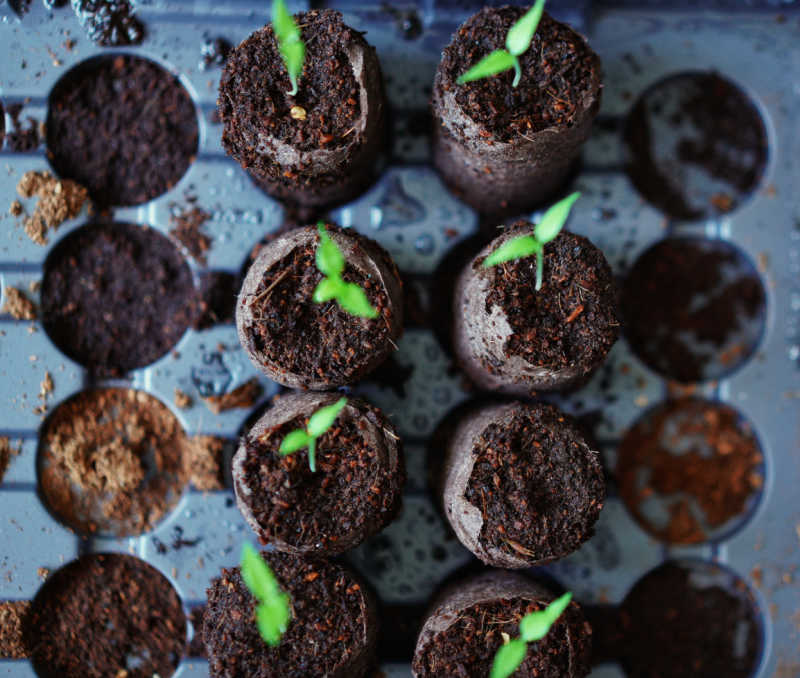
From the end of 2024, the sale of peat will be banned in England, with bans set to come into force later in Scotland and Wales. Northern Ireland is currently looking at peat and horticulture as part of its Peatland Strategy.
Until then, when looking to buy compost be aware. Some compost bags may be labelled as “eco-friendly” “organic” or “sustainable”. However, unless it’s specifically labelled as peat-free then you might be surprised to know that even these “eco-friendly” compost bags could contain as much as 70% to 100% peat.
To help you save thyme, here are the best peat-free compost brands in the UK to know:
Carbon Gold
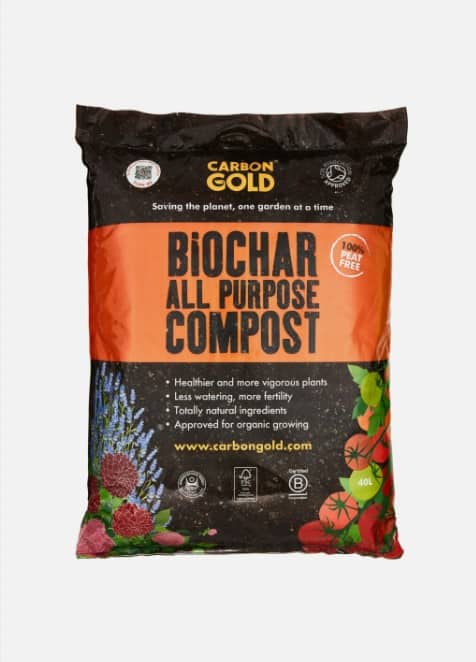
Carbon Gold (£32.97 for 30 litres at Crocus) is a great compost brand for peat-free organic gardening.
This All Purpose Compost is a 100% peat-free mix, that’s made in the UK. It’s bursting with nutrients from all-natural sources. This includes charred plant matter, seaweed, wormcasts, organic coir, mycorrhizal fungi and a vegetable-based nutrient blend.
These combine to create a fertile medium for vigorous, healthy root growth in a host of applications. From raised beds, flower and vegetable beds, pots, containers, hanging baskets, and window boxes – it’s a great all-rounder.
The compost is certified by the Forest Stewardship Council (FSC) – meaning it comes from sustainably managed sources. Plus it’s certified organic by the Soil Association.
Earth Cycle
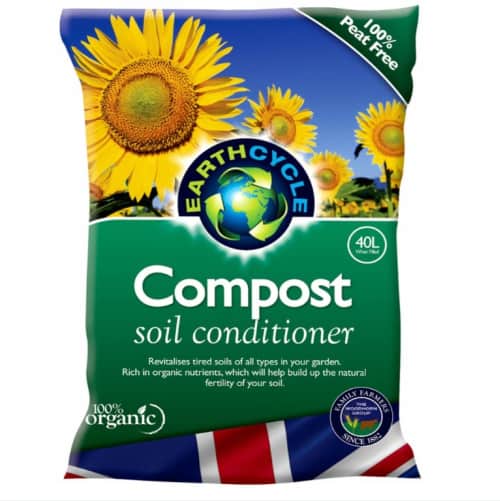
Earth Cycle (£19.99 for 40 litres from Thompson & Morgan) is an entirely peat-free and organic compost brand. In particular, this soil improver is made from processed and composted garden waste.
Packed with essential nutrients such as nitrogen, phosphate, potassium and trace elements, it also helps sandy soils retain moisture while improving aeration and drainage in clay soils.
As such, it’s ideal for mixing into beds and borders to increase fertility and improve soil structure. It’s also perfect for giving shrubs, trees and roses a helping hand when planting them out.
Incredipeatfree
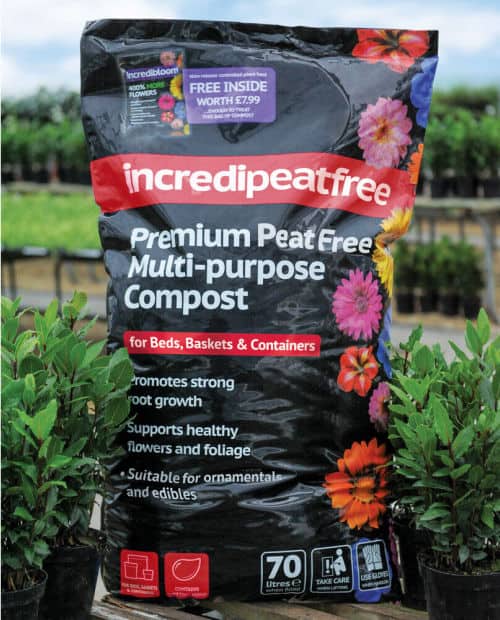
Incredi-range isn’t an entirely peat-free compost brand. However, its Incredipeatfree compost (£19.99 for 70 litres at Thompson & Morgan) is well worth a look.
Perfect for beds, baskets and containers, this top-rated compost is loved by gardeners across the UK. And for good reason. It’s been blended specifically with drainage and aeration in mind. This provides your plants with the optimum growing conditions for growth and helps promote strong roots and healthy flowers and foliage.
For Peat’s Sake
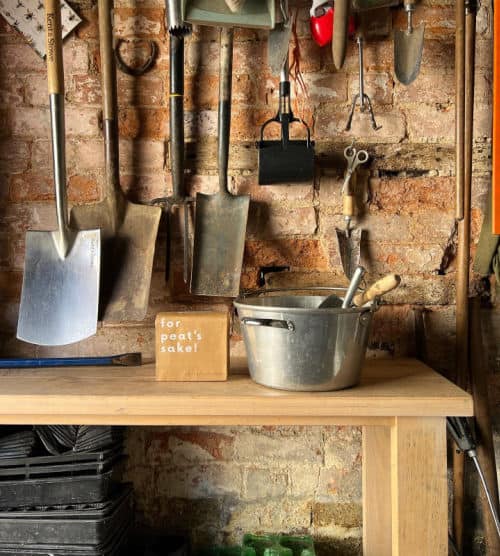
If you’re short on storage space, For Peat’s Sake sells a handy 600g block of dehydrated sourced coir for £8.50. Simply add water, and it then expands to create up to 11.5 litres of compost.
Made from sustainably sourced coconuts, For Peat’s Sake can be used for a whole host of growing applications. From houseplants, herbs, fruit, vegetables and cacti, it’s a great all-rounder.
The coir compost helps to improve drainage, air circulation and water retention. Plus, it absorbs, stores and releases nutrients effectively. This reduces nutrient leaching and helps your plant absorb plant food more efficiently.
As well as being peat-free, I love that it comes packaged in recyclable paper packaging. In fact, it’s the only peat-free compost brand I’ve come across offering plastic-free packaging.
RocketGro
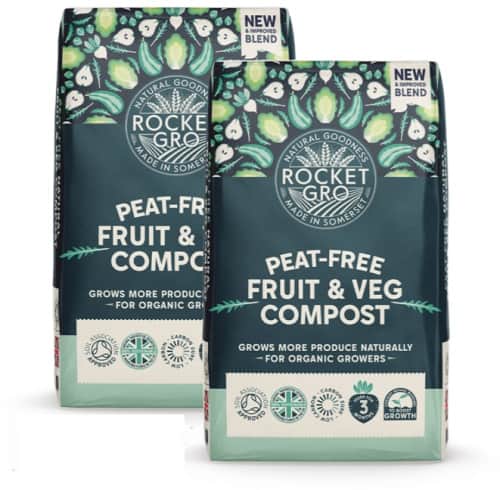
If you are looking for organic and peat-free compost that’s been specially formulated for fruit and vegetables, then head straight to the Rocketgro brand (£17.99 for 50 litres from Thompson & Morgan).
This 100% Soil Association-certified organic and peat-free compost contains an exact balance of nutrients to feed your vegetable plants, young fruit bushes and fruit trees for three months without the need for any fertiliser top-ups.
What I particularly love about RocketGro from an environmental standpoint is that it makes its compost on its farm in Somerset as a by-product of renewable energy production. So as well as powering thousands of homes sustainably, you’re getting organic peat-free compost for your garden.
What I don’t love is that RocketGro’s compost comes in plastic bags. However, RocketGro says the bags contain 30% recycled plastic, and, as they are 100% recyclable. Don’t recycle them at home though – take them to a supermarket plastic bag collection point.
Does Peat-Free Compost Work?
Some people say they don’t like using peat-free compost as it doesn’t give them the yield that they’re looking for. To be honest we’ve noticed no difference in what we grow.
We went peat-free over 10 years ago, and we’ve had bumper crops of courgettes, bountiful supplies of potatoes and blooming borders filled with bee-friendly plants.
Like all gardeners, we’ve also had some gardening fails. But I wouldn’t pin this on the compost – more on slugs, weather, and gardener error!
Is There An Alternative to Peat-Free?
If you don’t want to fork out (pun intended!) for peat-free compost from one of these brands, then you could try homemade compost, bark, coir, or wood waste. Alternatively, you could buy a bag of peat-free compost and make it go further by mixing it with some homemade compost or coir.
Found this post useful? Find more green gardening tips this way!
Found this post useful? Please consider buying me a virtual coffee to help support the site’s running costs.


